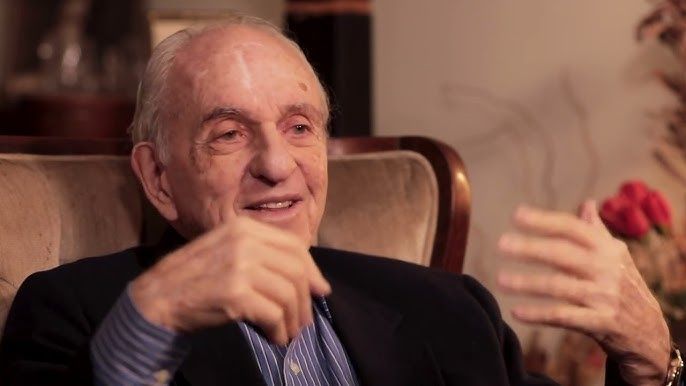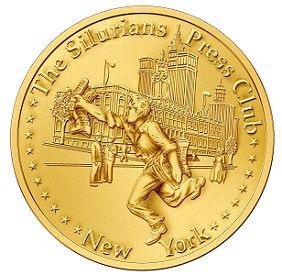
Myron "Mike" Kandel
Mike Kandel at 95: Unfiltered and Unforgettable
By Mel Laytner
The Silurians Press Club is no stranger to legendary journalists, but few can hold a room with the charm, wit, and sheer force of intellect that is Myron “Mike” Kandel.
At 95, the financial journalism pioneer walked up to the podium at the Silurians May 21 luncheon with the casual confidence of a man who been there, done that, and probably re-edited your lede on his way. He had stories. He had punchlines. He had a lifetime worth of hard-earned wisdom.
Introduced with affection by Joe Berger, who presented Kandel with a framed commendation for "unbridled service" and "brilliant leadership." Mike, true to form, took the frame and the room with the same understated manner. “Thank you, Joe and everyone.” Pause. “I’ve only been a Silurian for 54 years.
Kandel’s journalism journey began humbly in 1951 as a part-time copy boy at The New York Times, which, he said, was “lower than a copy boy” because it was only two days a week.
However, after learning that any staff member could submit an editorial, Kandel penned his solution to the Korean War, confidently submitting it to Charles Merz, editor of the Times editorial page.
It never ran.
Recalibrating, he submitted another editorial, urging people to donate blood. That one made it into print, as did two others on supporting UNESCO and the Brooklyn Botanical Garden. “I was in favor of both,” he added, evoking laughter.
From Copy Editor to Business Reporter
Kandel rose through the Times to become its youngest copy editor. Friends would ask how he edited legendary reporters like Homer Bigart, Meyer Berger, and Peter Kihss: "Gently. Very gently."
Then there was the time when a PR firm offered to double his Times salary—from $9,000 to $18,000 a year. He consulted his wife, Thelma. "What do you want to do?" she asked. "I said, 'I want to stay at the Times.' She said, 'That's it'—and that was it."
Or the time he and Gay Talese almost published a story for the Reader’s Digest. Though the story never ran, Kandel and Talese split the $1,800 advance. “I forgot whatever happened to him,” Kandel deadpanned. “But I think he did OK.”
Though he pushed to be a reporter—“The joke was, copy editors were reporters whose legs gave out”—the move to financial news came serendipitously, after learning the Times business section was suddenly short three reporters.
Asked what he knew about business news, Kandel replied, “I studied economics in college.” Yes, but he had taken only one class, Economics 101. Which led to a typical Kandel aphorism: “Never lie, but you don’t have to tell all of the truth.”
After 14 years at the Times, he recruited by the Washington Star to became its financial editor, then moved to the New York Herald Tribune, and had a very short stint at the Rupert Murdoch’s NY Post.
CNN: A New Concept in Broadcast News
The transition from print to television wasn't exactly planned.
A friend urged him to take a lunch meeting with Reese Schonfeld, who was helping Ted Turner put together CNN. Kandel said he agreed, more because lunch was at the Algonquin Hotel’s famed Round Table than any serious thought of landing a new job.
Schonfeld persuaded Kandel to take a screen test. "I figured no way I was ever going to be on television.” After the test involving nothing but a camera, a stranger, and a carbon copy of his latest column, Schonfeld offered Kandel a backhanded, albeit charming, job offer: "What you don't have in the television graces you make up in knowledgeability, sincerity and credibility."
Ted Turner sealed the deal with characteristic flair. "When we go on the air June 1st, we don't go off the air until the world comes to an end," Turner told him, pointing dramatically. "If that happens, I expect you to stay on the job and cover the story."
Kandel stayed for 25 years.
One defining moment came on Black Monday, October 19, 1987. The Dow Jones Industrial Average dropped nearly 23 percent. While other networks hedged, Kandel pushed for clarity. "It was a crash. And if it was a crash, we should say it was a crash. And we did." He also advised his viewers not to panic, that the market would recover. It did.
When the News Game Changed
But not all his CNN memories were fond. Looking back on the network’s handling of the 2016 election, he said, “We gave [Trump] airtime because... he was ratings. The name of the game became ratings, not news. Once it became ratings, the whole atmosphere changed.”
Kandel warned the network brass about Fox News’s rise. “I said we should take an advertising campaign saying: If you want your news with a right slant, watch Fox. If you want it down the middle, watch us—CNN.” But leadership declined. “They said, ‘We don't want to dignify them.’”
As a result, “Fox News was eating our lunch.”
He was even more troubled by current developments—like CBS’s apparent willingness to settle a lawsuit from President Donald Trump about the editing of a Kamala Harris interview on 60 Minutes.
“That’s absolutely unprovable...If they (CBS’s corporate owner, Paramount) succumb to that, I think it's terribly damaging, and it reflects on all of us who are either journalists or care bout journalism.”
Mel Laytner, a Silurians Board member, was a reporter and editor of hard news for 20 years, much of it covering the Middle east for NBC News and UPI. He is author of the acclaimed investigative memoir, What They Didn't Burn.


